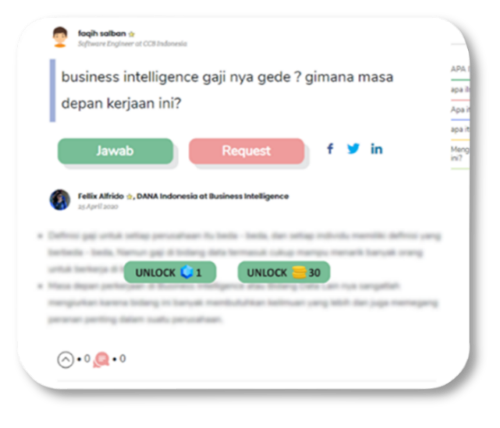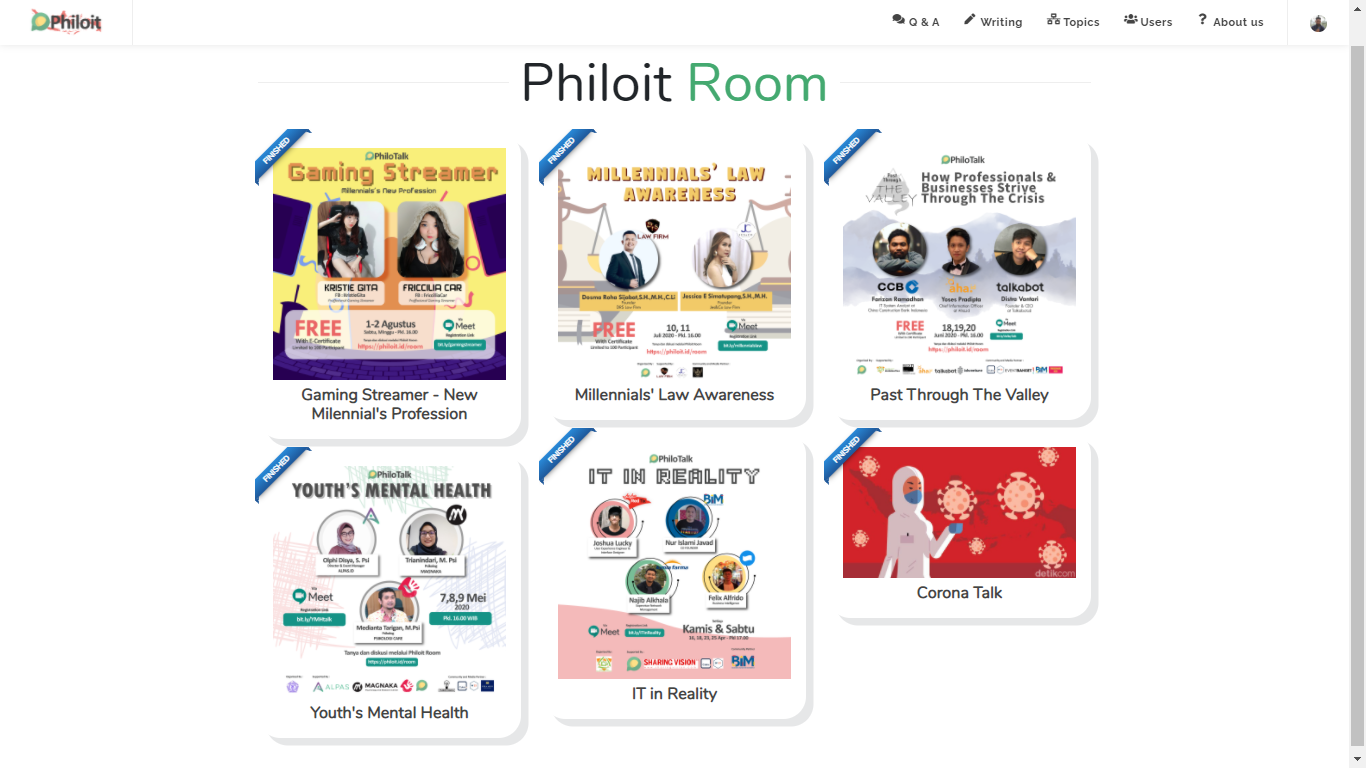Not just building a question-and-answer platform, Philoit was initiated last year because of the uneasiness of the “unconscious problem” or the phenomenon of unconscious problems in society, which was felt by the Co-Founders Philoit Aldi Tahir and Pieter Surya. They feel that young people in Indonesia spend their energy on content that does not build literacy and knowledge in digital media.
From the data Aldi quoted, more than 60% of Indonesia’s young people spend more than 4 hours on the Internet. In fact, as many as 7% of them spent more than 11 hours on the internet. In other words, the youth’s time and energy is spent on media discussion content that does not build knowledge, such as the thousands of comments on YouTube and Instagram that every opinion written on them will not be read and lead to ongoing discussion.
“This anxiety makes it difficult for us to share the background of [the Philoit being initiated], because the problem we are solving is called an” unconscious problem “. But fortunately recently there was a Netflix documentary “The Social Dilemma” which can very clearly describe the problem in the algorithm on the internet, making us bound and become a product of media consumption, “explained Aldi to DailySocial.
The background of the two co-founders has to do with the core product of Philoit. Aldi mastered technical expertise in data & machine learning which was strengthened by literacy from books about technology and its relation to human behavior in consuming the digital world, and the use of AI.
Meanwhile Pieter has a passion in education in the field of teaching teachers and tutors. He previously started a startup called Tutoreal, to connect parents who need tutors. “But before Pieter launched its digital product, we met and agreed to build a Philoit.”
Philoit is one of the startups participating in the DailySocial Launchpad 1.0 incubation program, the incubation program from TheGreaterHub SBM ITB, BekUP Bekraf for Startup 2020, Cubic Incubator (Bandung), and one of the startup partners at Block71 Bandung.
Currently, Philoit is still actively mentored by Aji Santika from Feedloop-DeepTech-StartupBandung and Novistiar from HarukaEdu.
Zhihu as an objective not Quora
Aldi continued, a popular question-and-answer platform, especially in Indonesia, is Quora, which is always used as a mecca. Even though the basic functionality of the platform is similar, he claims Philoit is more focused on providing features to engage active users in discussions within the application.
These features include gamification, points & levels, titles & achievements, and the digital currency “Philoit COIN” which can be exchanged for prizes. “Philoit wants to stand in the middle as a combination of conventional forums and media-based applications full of various unique features because its aim is to target young people.”
He prefers to place Philoit as an “expert hub” by taking the mecca of a Chinese player named Zhihu. This question and answer platform is included in the top 10 most accessed applications in the Bamboo Curtain country. Its features are more or less the same as Philoi, there are gamification and stats features, like playing games in the form of sharing and discussion.
“Apart from that, the demographics and forms [of habits] of Indonesians and Chinese are similar, which can be good examples in building a similar success platform.”
Because he is passionate about becoming an expert hub, Aldi admits that his party is still perfecting Philoit’s features and core business which will be implemented by inviting experts to join. This is because the company wants to build an ecosystem from a question and answer platform first, then inviting credible people into it.
This strategy was taken because the lessons learned were drawn from the failures of previous players, that in the early stages they immediately used experts / public figures to attract the audience. Meanwhile, the discussion ecosystem in which the form is formed and has not even been validated, which in the end faces difficulties in maintaining the experts / figures in it.
Business plan and challenges
Aldi said that currently Philoit has not carried out monetization. However, in the plan, the company will implement a business model form “Pay Per Question”, not freemium or subscribe. For that, he invites credible experts or resource persons to the platform to answer any questions.
“Just like experience in the game world, users are required to buy diamonds which will later be used to ‘unlock’ content from experts.”
According to him, this concept is the customization of the user experience because users can choose what content they need and want to access. Moreover, this method is in accordance with the habits of young people who tend to be choosy. Users only need to pay for content for which they want to read answers, opinions, or opinions, from experts who are experts in their fields.

As for the challenge itself, considering that Philoit has a coin redeem feature as a form of appreciation for every opinion, discussion, point of view, and a form of content contribution from anyone and gives the same right to benefit.
“This is very different from other UGC platforms which do manual filtering of people who become partners or special contributors and get benefits such as money and others.”
However, at the beginning of the test, many users took advantage of the gap in order to collect as many coins as possible in various ways. Common examples include answers that do not fit the context of the question, copy and paste other people’s answers or from other content without including links, spam best answers, spam unvotes, and use multiple accounts.
“There are even those who directly attack our system and access coin changes through the database. Honestly, that’s not what we wanted from this coin system. ”
Finally, the team made a strategy change by updating the terms and conditions of the redemption, and updating the system that could automatically differentiate content quality based on text analysis. You do this by giving weight to the input from the user, so that the provision of content by the system varies.
Meanwhile, to minimize negative content, his party chose several active users to become moderators who manually report on existing content.
“For other challenges in the future, we believe there will still be, but on the way, we believe that honesty from users, sincerely sharing opinions along with a balance of benefits to be obtained, will form a good sharing ecosystem in Philoit.”
Aldi explained that in the future he wants to apply AI technology like those already used by large platforms such as Quora and Zhihu. Also, developing other interesting features such as Room to accommodate the questions and answers that occur during an event

“We have tried this feature by conducting several independent events and inviting experts in the form of sharing and online discussions. Every question submitted to the expert at the event will be shown live in a specific room that can be accessed by anyone, even after the event ends, “he concluded.
Philoit has so far been bootstrapping and is planning to do some fundraising. Since its release last year, now Philoit has more than 20 thousand registered users with a total of about 190 thousand question and answer content and 14 thousand blog posts. The application has been downloaded more than 10 thousand times on the Play Store.
–
Original article is in Indonesian, translated by Kristin Siagian